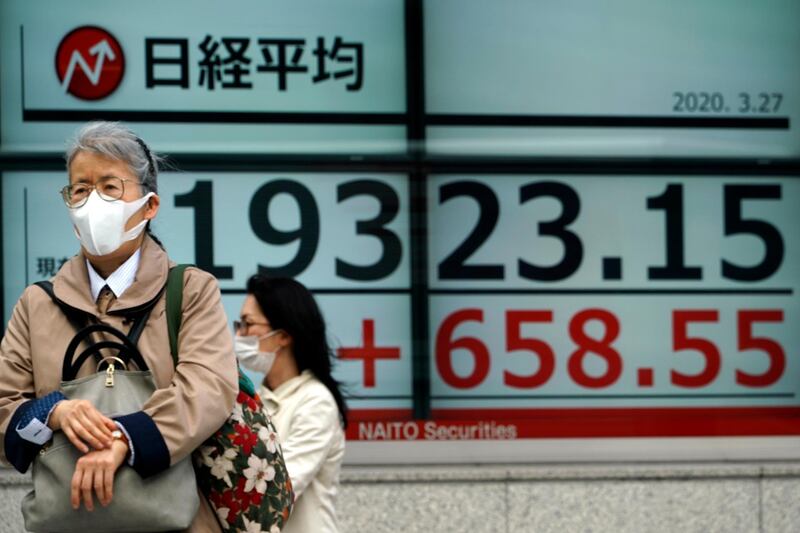Asian stocks rose on Friday as investors wagered policymakers will roll out more stimulus measures to combat the coronavirus pandemic after US unemployment filings surged to a record.
MSCI's broadest index of Asia-Pacific shares outside Japan rose 0.3 per cent, while Japan's Nikkei rose 3.88 per cent, capping its biggest weekly gain on record. Australian shares gave up gains to fall 5.3 per cent after a strong week.
New York-based MSCI is a global provider of equity, fixed income, hedge fund stock market indexes, and multi-asset portfolio analysis tools.
Indian shares also rose in early trade on Friday, a day after the government announced a relief package to help the poor cope with widespread disruptions from a coronavirus-triggered lockdown, as investors hoped for more stimulus measures from the country's central bank.
Chinese shares, battered this month because of the virus, rose 0.32 per cent on Friday. Shares in South Korea, another country hit hard by the pandemic, rose 1.87 per cent.
Coronavirus: What is a pandemic?

Pan-regional Euro Stoxx 50 futures were down 0.51 per cent, German Dax futures fell 0.61 per cent and FTSE futures were down 1.31 per cent, suggesting gains in Asian shares will not carry over into Europe.
The dollar fell against major currencies as central banks' repeated steps to solve a dollar shortage in funding markets started to gain traction.
The US House of Representatives is expected to pass a $2.2 trillion (Dh8.07tn) stimulus package that will flood the world's largest economy with money to stem the damage caused by the pandemic.
The US is now the country with the most coronavirus cases, surpassing even China, where the flu-like illness first emerged late last year. Policymakers may need to offer more stimulus as the virus slams the brakes on economic activity and increases healthcare spending.
"I am not sure what measures are left, but the reaction in stocks shows some people hoping for more stimulus thought the market was a little oversold," said Yukio Ishizuki, foreign exchange strategist at Daiwa Securities in Tokyo.
"Currencies tell a different story. The dollar is the lead actor. The mad rush to buy dollars due to liquidity concerns is starting to fade."
The number of Americans filing claims for unemployment benefits surged to a record of more than 3 million last week as strict measures to contain the virus pandemic ground the country to a sudden halt, data showed on Thursday.
The jobless blowout was announced shortly after Fed Chairman Jerome Powell said the US "may well be in recession", an unusual acknowledgement by a Fed chair that the economy may be contracting even before data confirms it.
Global equity markets took the data in their stride, partly as most central banks have already aggressively eased policy and governments are backing this up with big fiscal spending.
Leaders of the G20 economies pledged on Thursday to inject over $5tn into the global economy to limit job and income losses from the coronavirus.







